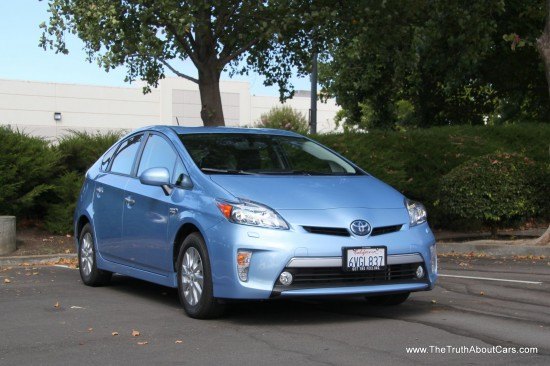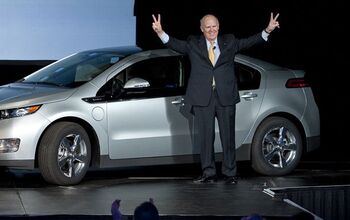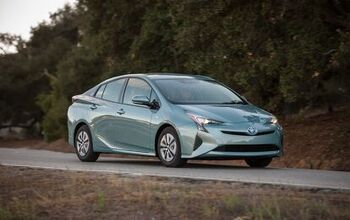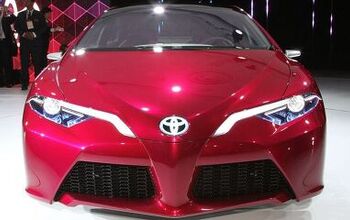As Prius Sales Rise, So Do Sales Of The Prius
Oddly enough, the presence of the roomy Prius V and less costly Prius C have done little to harm the popularity of Toyota’s primary hybrid, the Prius. More accurately, since Toyota introduced the V, C, and Plug-In versions, sales of the core model have done nothing but rise.
Two questions arise. First, to what extent have sales of the Prius risen? Second, what happened that made it possible for Prius sales to have grown as competition became more fierce?
Briefly put, even when excluding its recent additions, the Prius is routinely one of America’s 20 best-selling passenger cars. Sales of the Liftback, which is what Toyota calls the Prius that we know best, rose 15.2% to 147,507 in 2012. Add to that another 12,750 sales of the Prius Plug-In, a car which uses the Liftback’s body.
Toyota USA did manage to sell more Prii in 2007 and 2008 than in 2012, but after three consecutive years under or around 140K units, last year’s Prius climb is meaningful. Moreover, the 15.2% year-over-year growth exceeds the overall market’s 13.4% increase. The Prius Liftback outsold the Chrysler 200, Mazda 3, Subaru Outback, Volkswagen Passat, Kia Soul, Nissan Sentra, and BMW 3-Series last year. (More recently, the Prius quartet outsold the whole Buick division; Cadillac, Audi, and Acura, too, and ranked as America’s 15th-best-selling vehicle line in January.)
We’re long past wondering how Toyota sells tens of thousands of Prii each year. That’s been going on for nearly a decade. Switching from a small sedan to a roomy hatchback played a large role in the transition from niche hybrid to mainstream player. Maintaining affordability helps, too, regardless of how many members of the enthusiast press loathe the car’s sterilized dynamics.
U.S. Prius volume first topped 100,000 units in 2005. But back then, the Prius accounted for 6% of Toyota brand sales. In 2012, the Prius Liftback was worth 8.4% of Toyota brand sales, equal to the Prius’s value to Toyota in the model’s highest-volume year, 2008.
One could have imagined, however, that in 2012, Toyota would have sold more Prii overall, but only because of the addition of the Prius V, Prius C, and Prius Plug-In. And yes, Prius family sales rose 73.4%, an increase of more than 100,000 units compared with 2011, when the family consisted of the Liftback and less than half a year of effort from the Prius V.
In ten months, the Prius C contributed more than 35,000 units. The Prius V added nearly 41,000 more. In theory, the Liftback’s 19,443-unit increase came about not in spite of the C, V, and Plug-In, but because of their debuts. Rather than cannibalizing the conventional Prius, as one might have expected when a more versatile model and a cheaper hatchback were added to the fleet, the Prius Liftback has benefited. Even in Canada, where the Prius V outsells the Prius Liftback, sales of the original have grown quickly, although the Prius family does not have the impact in Canada that it does in the U.S.
Perhaps it’s the marketing dollars spent informing consumers about the new C and V – messaging which, by proxy, marketed the original Prius, too. In addition to the marketing, there’s no doubt that an increased level of competition does wonders for established players, if’n it don’t kill’em.
Just as individual fast food outlets can thrive when positioned next door to one another in a shopping mall’s food court, newfangled automobiles can, periodically, fare better when others roam in the vicinity. The BMW 6-Series, Mercedes-Benz SL, and Porsche 911 all posted above-average increases in 2012. No one model advanced at the expense of the other two. The same thing occurred with the Audi Q5, BMW X3, and Mercedes-Benz GLK, three German rivals which together grew at an above-average rate.
As for the Prius, not only do the Prius C, slightly more popular Prius V, and Prius Plug-In shine a light on the Prius patriarch, the increased hybrid awareness brought on by gas-electric derivatives of mainstream cars do the same. It seems perfectly reasonable to conclude that the attention we pour out on the Leaf, Volt, Fusion Hybrid, and even the Tesla Model S causes consumers to take a second look at an old darling of the green car fanbase. The result? This car which seemed so alien in 1999 is now as normal and expected as most midsize sedans.
Naturally, there’s a flip side to the coin. Honda Insight sales fell 62% to 5846 units in the U.S. last year.
More by Timothy Cain
Latest Car Reviews
Read moreLatest Product Reviews
Read moreRecent Comments
- Fred I would get the Acura RDX, to replace my Honda HR-V. Both it and the CRV seats are uncomfortable on longer trips.
- RHD Now that the negative Nellies have chimed in...A reasonably priced electric car would be a huge hit. There has to be an easy way to plug it in at home, in addition to the obvious relatively trickle charge via an extension cord. Price it under 30K, preferably under 25K, with a 200 mile range and you have a hit on your hands. This would be perfect for a teenager going to high school or a medium-range commuter. Imagine something like a Kia Soul, Ford Ranger, Honda CR-V, Chevy Malibu or even a Civic that costs a small fraction to fuel up compared to gasoline. Imagine not having to pay your wife's Chevron card bill every month (then try to get her off of Starbuck's and mani-pedi habits). One car is not the solution to every case imaginable. But would it be a market success? Abso-friggin-lutely. And TTAC missed today's announcement of the new Mini Aceman, which, unfortunately, will be sold only in China. It's an EV, so it's relevant to this particular article/question.
- Ajla It would. Although if future EVs prove relatively indifferent to prior owner habits that makes me more likely to go used.
- 28-Cars-Later One of the biggest reasons not to purchase an EV that I hear is...that they just all around suck for almost every use case imaginable.
- Theflyersfan A cheaper EV is likely to have a smaller battery (think Mazda MX-30 and Mitsubishi iMEV), so that makes it less useful for some buyers. Personally, my charging can only take place at work or at a four-charger station at the end of my street in a public lot, so that's a crapshoot. If a cheaper EV was able to capture what it seems like a lot of buyers want - sub-40K, 300+ mile range, up to 80% charging in 20-30 minutes (tops) - then they can possibly be added to some lists. But then the issues of depreciation and resale value come into play if someone wants to keep the car for a while. But since this question is asking person by person, if I had room for a second car to be garaged (off of the street), I would consider an EV for a second car and keep my current one as a weekend toy. But I can't do a 50K+ EV as a primary car with my uncertain charging infrastructure by me, road trips, and as a second car, the higher insurance rates and county taxes. Not yet at least. A plug in hybrid however is perfect.


































Comments
Join the conversation
"We understand the rationale behind the Prius V wagon. It's a natural progression from the smaller hatchback, and quite frankly we wonder what took Toyota so long to bring it to market. That said, the Jetta SportWagen TDI is simply more rewarding to drive in nearly every situation...drives, looks and simply behaves more like a "regular" wagon. Call us crazy, but when we press the accelerator, turn the steering wheel or even want to manually select a gear, the Jetta SportWagen actually goes, turns and shifts like we expect." Edmunds comparison of the two.
I can't understand the cheap/sweaty vinyl seats in the high end models. Does the target demographic find them reassuring like Depends? For that kind of money it should be better than a picnic table covering. Some perforations might help. You can't get a panoramic (plastic) sun roof without them, either. Without that feature the experience is decidedly claustrophobic, especially in the original. BTW, how much head light polish is it going to take when they yellow/fog, just out of warranty? Tried them all. Walked away. I don't want to rush the Depends...